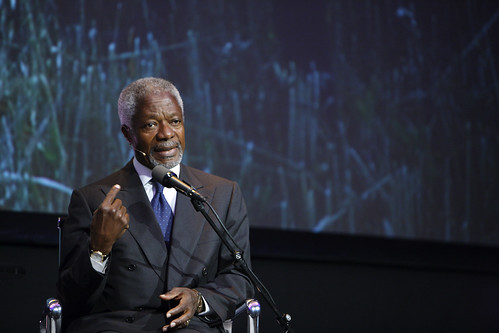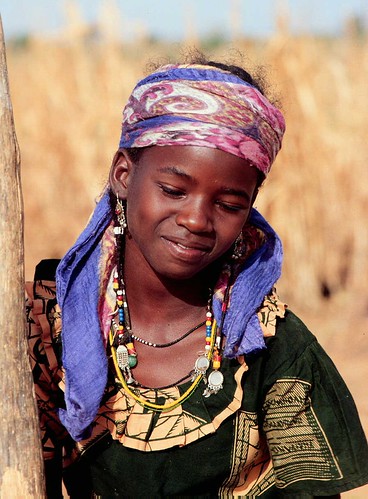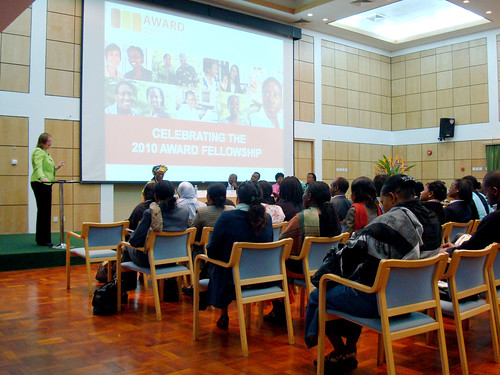Kofi Annan speaking at the African Green Revolution Forum held in Accra, Ghana, September 2010 (photo credit: AGRF).
An inaugural African Green Revolution Forum has moved Africa forward in its quest to transform agriculture and tackle food security.
Closing the Forum in Accra, Ghana, on 4 September 2010, the Forum's chair, Kofi Annan, praised efforts to accelerate a green revolution in Africa. The Forum's executive co-producer, Akin Adesina, said the meetings kick-started a new phase in an African green revolution. The Forum agreed to pool efforts and resources to scale up breadbasket project plans and investment blueprints for agricultural growth corridors. Ghanaian Minister for Agriculture, Kwasi Ahwoi, invited new partners to join the Ghana breadbasket initiative. The Prime Minister of Tanzania, H.E. Mizengo Pinda, agreed to finalise a blueprint for the Tanzania Southern Corridor by January 2011.
The Forum participants specifically agreed on the following actions:
· empower women by accelerating their access to technologies, finances and markets
· scale up farmer and agri-business access to finances
· invest in science, technology and research for food and nutritional security
· increase access to improved seed via plant breeding, seed companies and seed distribution systems
· improve fertilizer supply systems and build more efficient fertilizer value chains
· link agri-business to commercial farms and smallholder farmers
· manage water resources better
· make better and wider use of 'mixed' farming systems that raise animals as well as grow crops
The director general of the International Livestock Research Institute (ILRI), Uruguayan agricultural economist Carlos Seré, participated in the Forum and led a panel session of livestock development. A report on that livestock session will be posted here later this week.
The African Green Revolution Forum issued a detailed plan of action to the delegates. Government and development groups, including the African Union and the Alliance for a Green Revolution in Africa, will conduct peer review assessments.
'We pledge ourselves to work with all other key partners to ensure that capacity is not a limiting factor in the green revolution,' said Namanga Ngongi, President of the Alliance for a Green Revolution in Africa, the organization that founded the Forum alongside Yara.
Mr Annan thanked the government leaders, including H.E. Mizengo Pinda, H.E. Olusegun Obasanjo, former President of Nigeria, and the Hon. John Dramani Mahama, Vice President of Ghana, who had taken part in the African Green Revolution Forum. 'These gracious, impassioned leaders threw their political weight behind this shining moment of transformation for Africa,' said Mr Annan.
And he urged governments and parliamentarians to help eradicate poverty and realise the dream of a green revolution. 'The time for action is now. For as you leave this forum, you are carrying upon your shoulders the vibrant hopes of a generation and a continent. We will not dash the dream of the African farmer,' said Mr Annan. 'With our hands on the plough, we will till this beautiful land’s soil together, and help Africa reap a bountiful harvest.'
About the Forum
The African Green Revolution Forum brings together African heads of state, ministers, farmers, private agribusiness firms, financial institutions, non-governmental organizations, civil society and scientists to an African-led forum to promote investments and policy support for driving agricultural productivity and income growth for African farmers in an environmentally sustainable way.
This public-private network it is a catalyst for the African Green Revolution called for by former UN Secretary General Kofi Annan in 2004. The Forum gathered momentum during three successful African Green Revolution conferences in Oslo, Norway. This year it was held 2–4 September 2010 in Accra, Ghana, co-chaired by Kofi Annan. The African Green Revolution Forum is supported by the Alliance for a Green Revolution in Africa, Yara, the Rockefeller Foundation, the International Fund for Agricultural Development, the New Partnership for Africa's Development, the African Development Bank and Standard Bank.
Read more about the outcomes of the African Green Revolution Forum, media releases and a summary of the African Green Revolution parallel sessions here.



